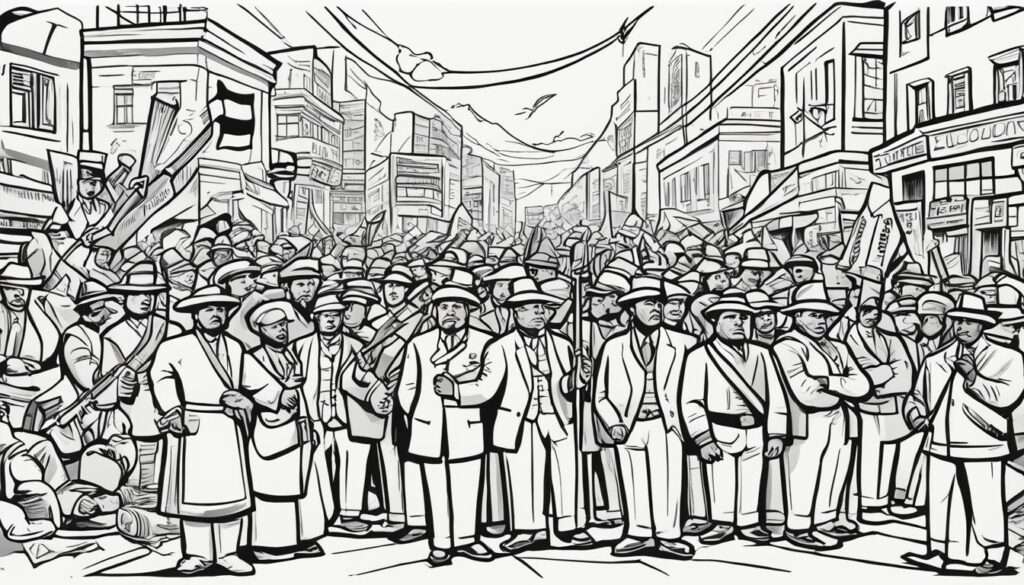In the arena of history and its discourse, the book “Provincializing Europe” emerges as a seminal contribution to postcolonialism, fervently questioning the underpinnings of European hegemony in historiography. Authored by the eminent scholar Dipesh Chakrabarty, the volume intricately examines the imperative for the decolonization of history, laying the foundation for a narrative that embraces historical difference across global cultures. Through this lens, Chakrabarty not only critiques the dominant paradigms of knowledge production but also calls into question the universality and unimpeachable status often afforded to European historical frameworks.
Significant in challenging the traditional chronicles of world history, this book offers a transformative perspective that seeks to disassemble the monolithic structures of historical interpretation that have historically marginalized non-European voices. The study pivots around the intrinsic need to reconfigure our understanding of the past in order to foster a historiographical balance that reflects the intricacies and distinctiveness of societies outside the Eurocentric gaze. It is a call to action for scholars and readers alike to engage in a critical dialogue on how postcolonial thought can reshape the ways in which we conceive and teach our collective histories.
Key Takeaways
- Chakrabarty’s work accentuates the urgency of integrating postcolonial perspectives into the historiographical canon.
- “Provincializing Europe” serves as a critical meditation on the dominance of European narratives in historical discourse.
- The book is a resolute manifesto for the historiographical recognition of the diverse, contextual histories of non-European societies.
- Exploring historical difference becomes a pathway to understanding the multiplicity of global historical experiences.
- As a pivotal text, this work catalyzes further debate and exploration on decolonizing history and knowledge production.
Introduction to Provincializing Europe and Its Thesis
Within the academic quest to untangle centuries of historiography, Dipesh Chakrabarty’s “Provincializing Europe” emerges as a critical voice advocating for a recalibration of how global history is understood and narrated. The critical endeavor seeks to address the hegemony of Eurocentrism and the way it has permeated the fabric of historical analysis, compelling a historiographical critique from a postcolonial vantage point. This section examines Chakrabarty’s core thesis which confronts the Eurocentric domination within world history, aiming to reposition Europe as one among numerous cultural provinces, each with their own unique influences on the collective historical tapestry.
This reconsideration of Europe’s place in global history is more than a geographical decentering; it is an intellectual upheaval that challenges the long-standing preeminence of European events, figures, and epochs. This historiographical critique delves into the biases that have long colored historical discourse and questions the normalcy of Eurocentric benchmarks in evaluating global developments. The postcolonial historiography put forth by Chakrabarty supports a multipolar perspective, where diverse historical trajectories are acknowledged for their distinctiveness and intrinsic value.
Let us explore some contrasts between traditional Eurocentric approaches and Chakrabarty’s proposal:
| Aspect | Eurocentric Approach | Chakrabarty’s Postcolonial Critique |
|---|---|---|
| Centricity | Europe as the universal standard | Europe as one of many cultural provinces |
| Historical Narratives | Linear progression and modernity centered on European developments | Diverse narratives that honor different paths to modernity |
| Contribution to World History | Non-European histories often marginalized or seen through European lens | Recognition of equal importance and independent contributions of all cultures |
| Historical Agency | European figures and states as prime agents | Inclusion of multiple geographical agents shaping history |
| Methodology | Standard historical methods with European origins | Adaptation of methods to fit diverse historical experiences |
The conversation initiated by “Provincializing Europe” is not merely academic. It represents an epistemological awakening that demands inclusion and acknowledgment of various forms of knowing and narrating the past. The quest to redefine Europe’s chronological dominance also represents a broader vision to democratize history, one where every voice and every story is positioned as an essential thread in the complex weave of global history. Thus, Chakrabarty’s work is a seminal contribution to both postcolonial historiography and a broader understanding of our world’s multifaceted past.
Author’s Background and Perspective on Postcolonial Thought
Exploring the academic landscape of postcolonial theory reveals a luminary figure in the form of Dipesh Chakrabarty, whose intellectual biography spans a trajectory steeped in colonial discourse analysis and the challenging of historical narratives. His scholarly endeavors offer critical insights into the pluralities of pasts and the necessity of including subjugated voices within the ambit of global historiography. An introduction to Chakrabarty’s background allows for a deeper understanding of the currents that shape his seminal work.
Academic Contributions of Dipesh Chakrabarty
A founding member of the Subaltern Studies group, Chakrabarty has been instrumental in broadening the scope of historical inquiry. His efforts in deconstructing Eurocentric approaches to history have paved the way for nuanced perspectives that consider the complexity of societal dynamics in the postcolonial world. The intellectual strides made by Chakrabarty include extensive research and teaching, culminating in his influential writings that interrogate the temporal and cultural frameworks imposed by colonial powers.
Intersection of Postcolonial Theory and Historiography
The confluence of postcolonial theory and historiography under Chakrabarty’s scrutiny presents a robust critique of mainstream historical methodologies that often overlook the diverse narratives of subaltern groups. By challenging the hegemony of Western canonical thought, Chakrabarty’s work fosters a dialogue that seeks to redefine the very fabric of history’s telling, ensuring that it is inclusive of the voices that were rendered silent or marginalized during colonial rule. His scholarship intimately engages with the disciplinary boundaries that have historically dictated what is legitimate knowledge, advocating for a historiography that accommodates multiplicity and difference.
| Significant Work | Areas of Focus | Impact on Postcolonial Studies |
|---|---|---|
| Provincializing Europe | Decentring Europe in history, acknowledging non-Western experiences | Shifted academic discourse to consider multiple epistemologies |
| Subaltern Studies Contributions | Deconstruction of historical narratives, privileging subaltern voices | Expanded the historical understanding of subaltern agency and resistance |
| Edited Volumes | Compilations of critical essays on history, society, and culture | Provided platforms for diversified dialogue and critique |
Chakrabarty’s distinguished career has been dedicated to unearthing the intertwined legacies of colonialism and shaping the discourse of postcolonial historiography. His cogent analysis and passionate advocacy for the inclusion of marginalized histories serve as a clarion call to re-envision the methodologies through which the past is remembered and retold.
Theoretical Underpinnings of Provincializing Europe
In “Provincializing Europe,” Dipesh Chakrabarty presents a robust theoretical framework that serves as a bedrock for his intensive narrative analysis and critique of Eurocentric history. Chakrabarty sets out to reorient the historical lens, amplifying voices from the global south to challenge the monolithic narrative propagated by European historiography. Let’s delve into the critical analysis and explore the inclusion of non-Western perspectives in global history.
Critical Analysis of European Historical Narratives
The book’s approach to European historical narratives is not merely oppositional but deeply analytical. Chakrabarty scrutinizes the foundational assumptions of European historiography by employing a postcolonial lens. He interrogates the implicit biases that have long steered the historical discourse, contributing to the perpetuation of a Eurocentric worldview. The narrative analysis reveals how this historical vantage point has been constructed and the scholarly methods that need reevaluation to enable a more inclusive understanding of global history.
Non-Western Perspectives in Global History
“Provincializing Europe” is a clarion call to integrate diverse historical perspectives from the global south. These perspectives provide an enriching counterpoint to the prevailing historical narratives and challenge the universality of the European experience. Chakrabarty emphasizes the significance of situating these diverse narratives within the global historical sphere, advocating for a more representative and equitable historical dialogue. The inclusion of non-Western perspectives not only enriches historiography but also offers new theoretical insights into our understanding of global history.
| Aspect | Eurocentric Perspective | Global South Perspective |
|---|---|---|
| Historical Narrative | Universalizes European experiences | Speaks to diverse and localized histories |
| Theoretical Framework | Often linear and progress-oriented | Considers cyclical and alternative conceptions of time and development |
| Methodology | Centers on European archival sources and accounts | Employs interdisciplinary approaches and oral histories |
| Representation | Favors European protagonists and events | Highlights leaders and movements from the global south |
| Epistemology | Privileges scientific rationalism | Values indigenous knowledge systems |
The reconfiguration of the historical narrative, as advocated by Chakrabarty, is not merely an academic exercise; it is a transformative undertaking that breaks the shackles of a Eurocentric approach to understanding our collective past. By integrating the theoretical frameworks and actionable methodologies that account for the diverse experiences of the global south, “Provincializing Europe” forges a path toward a more pluralistic and democratically nuanced historical comprehension.

Europe as the Epistemic Center: Challenging Hegemony
The traditional historiographical approach has long positioned Europe at the forefront of global knowledge production, presenting it as the natural, epistemological core from the Enlightenment to the modern day. Dipesh Chakrabarty’s seminal work, Provincializing Europe, provides an incisive epistemological critique of this positioning by dissecting and questioning the dominance of hegemonic narratives that emanate from a Eurocentric worldview.
As Chakrabarty engages with the task of decentering Europe, he urges an acknowledgment of the plurality of experiences and knowledges that make up our collective past. In doing so, he dismantles the hierarchical structures of European intellectual traditions that have silenced or marginalized alternative historical voices and perspectives. The text serves as a rallying call for historians, and scholars alike, to embrace multiplicity in their understanding of global history, which incorporates a diverse range of epistemic standpoints.
“Provincializing Europe is not a project of rejection. It is a project of renewal and enlargement, where a conversation on equal terms with the experiences of the non-European world may be possible.”
- Questioning Historical Universality: Emphasis on the local and the specific, as opposed to the global and the general, to challenge the universality of European historical experiences.
- Expanding the Historical Canon: Inclusion of non-European histories and narratives to create an inclusive canopy that shelters a more representative and democratic historiographical landscape.
- Rethinking Modernity: Arguing against the singular view of modernity that originates from Europe, and recognizing the multiple forms of modernities shaped by different cultures and histories.
The aim of Chakrabarty is to provide a more just and democratic space for the collective human past to be understood, a space where histories from the global south are as significant as those from the European continent. The profound impact of such a rethinking has led to vibrant discourses within academic circles, encouraging further epistemological critique and an ongoing commitment to a more pluralistic approach to the study of history.
Historical Difference and Cultural Relativism
In the quest to understand history, there is a growing acknowledgment of the historical specificity inherent to diverse cultural narratives. “Provincializing Europe” champions the imperative to appreciate the mosaic of human experiences within their distinct cultural contexts, cautioning against the homogenization that can arise from Eurocentric historiographical methods. This acknowledgment forges a deeper, more nuanced connection with the past, revealing that the fabric of history is woven with a plurality of threads, each colored by the unique hue of its cultural backdrop.
The historiographical method advocated by Dipesh Chakrabarty argues for a relativistic approach to interpreting histories, which considers the intricate complexities that characterize non-European societies and their historical development. It represents a shift towards a more egalitarian approach in understanding world histories, standing contra to the legacy of colonial imposition that has long narrated global history through a singular, European lens.
- Recognition of non-European historical agency and autonomy.
- Inclusion of indigenous knowledge systems and oral histories.
- Understanding local historical phenomena within their own frameworks rather than through imposed universal standards.
Through this lens, historical narratives are no longer constrained by a European perspective but are instead appreciated for their contribution to the global historical tapestry. By underscoring the historical specificity and cultural context of different societies, Chakrabarty’s work transcends conventional historiography, inviting scholars and readers alike to a more inclusive and respectful engagement with the past.
Major Themes and Case Studies in the Book
Central to the discussion in “Provincializing Europe” by Dipesh Chakrabarty, is a novel elaboration on modernity narratives and their nuanced interpolations within the context of national identity. The work transcends the realm of comparative historiography, closely inspecting the way historical discourse is framed by the interplay of these elements.
Cultural Diversity and the Construction of Modernity
Chakrabarty’s seminal book intricately weaves the complex tapestry of cultural diversity, emphasizing its role in shaping the narratives of modernity. He presents modernity not as a singular, universal process, but as a multitude of varied narratives, each influenced by distinct cultural experiences. The author unfolds the discourse surrounding modernity, focusing on how pluralistic interpretations provide a more comprehensive understanding of historical progression.

In the pursuit of explaining the heterogeneous nature of modernity’s construction, Chakrabarty provides a lucid critique of the monolithic representation historically favored by Eurocentric discourses. This criticism foregrounds the importance of local experiences and indigenous narratives in contributing to a global comprehension of modern times.
Role of Nationalism in Historical Discourse
An examination of the role nationalism has played in framing historical accounts is crucial for Chakrabarty’s argument. Nationalism, as he elucidates, is not merely a sentiment binding a group of people but is indicative of a larger dialogue on self-identity and recognition. By introducing case studies that highlight the interdependence of nationalism and historical narratives, the author demystifies the process involved in the creation and perpetuation of national stories.
| Concept | Narrative in European historiography | Representation in Non-European Contexts |
|---|---|---|
| Modernity | Characterized as uniform progress stemming from the Enlightenment values | Diverse trajectories informed by local histories and cultural practices |
| National Identity | Often conflated with the rise of the nation-state | Rooted in pre-colonial socio-political structures and collective memory |
| Historical Discourse | Dominated by a linear, teleological narrative | Pluralistic, acknowledging cycles and varied notions of time |
To grasp the intricacies of cultural interactions with modernity, Chakrabarty encourages a variety of historical lenses, urging an embrace of multiple vantage points that honor the specificity of each cultural situation. His pragmatic approach through comparative historiography presents a more nuanced vision of global history—an inclusive, multi-faceted account, where European narratives serve as dialogical partners rather than authoritative scripts.
Impact and Criticism of Provincializing Europe
The discourse surrounding Provincializing Europe has been marked by a profound historiographical impact, provoking postcolonial criticism and a varied scholarly reception. Dipesh Chakrabarty’s seminal work has been pivotal in re-examining historical paradigms and offering a fresh lens through which global history is interpreted.
Academic Impact on Historical Studies
“Provincializing Europe” has spurred a wave of critical thinking within academic circles. It has led to the reassessment of entrenched narratives and has been influential in encouraging historians to widen their purviews beyond the Eurocentric contours of world history. Chakrabarty’s postulates have boosted scholarly endeavors to incorporate subaltern voices, thus broadening the realm of historiographical inquiry.
Debating Provincializing Europe: A Balanced View
While “Provincializing Europe” is widely celebrated for its innovative approach, it has not been exempt from criticism. Detractors highlight potential oversights in regard to the homogeneous portrayal of European thought and ramifications on the established historiographical structure. Nonetheless, the book’s influence on fostering dialogues across divergent historiographical methodologies continues.
Here, we juxtapose the overarching academic endorsements against the critiques that have emerged, presenting an unbiased examination of Chakrabarty’s contribution to historical discourse:
- The historiographical impact includes encouraging the emergence of new research questions which prioritize non-European perspectives and experiences.
- Postcolonial criticism has centered on the book’s potential reductionism by ascribing a monolithic narrative to European historiography.
- The scholarly reception spans widely from high commendation for its intellectual bravery to cautious scrutiny of its theoretical propositions.
This balanced perspective underscores that the value of “Provincializing Europe” lies not only in its content but also in its ability to stimulate ongoing scholarly conversation and debate.
“Book Summary”: Synthesizing Chakrabarty’s Key Arguments
In a decisive historiographical debate, “Provincializing Europe” presents a seminal critique of the Eurocentric historiography that has dominated global historical analysis. This book summary aims to provide a critical synthesis of Dipesh Chakrabarty’s influential arguments that question the very foundation of our understanding of history. The text weaves through Chakrabarty’s persuasive appeals for the inclusion of non-European histories to promote a multivocal world historical narrative and address the imbalance created by European dominance in the field.
- Chakrabarty argues for appreciating the unique historical experiences of non-European cultures without the constraints of European historiographical methods.
- The author asserts the presence of a significant disjunction in the application of European historical frameworks to non-European societies.
- He proposes a transformative approach that views Europe’s historical development as just one among many and not the universal pathway for all societies.
- The book stresses the need for an epistemological shift that acknowledges non-Western histories and knowledge systems on their terms.
- It encourages a move from a historiography of “what happened” to one that asks “how we understand and interpret what happened” from a pluralist perspective.
Chakrabarty’s “Provincializing Europe” not only triggers poignant questions within historical circles but also advances the efforts to decolonize history by transforming the narrative beyond hegemonic structures. As a critical synthesis of its content, it is clear that the book represents a paradigm shift, encouraging an openness that could ultimately lead to a more comprehensive and inclusive historiography.
Conclusion
As we come to the close of our exploration of “Provincializing Europe,” it is evident that the text stands as a monumental contribution to postcolonial scholarship, urging an essential historiographical reimagination. Dipesh Chakrabarty’s profound critique has set into motion a critical dialogue about decolonizing history, going beyond mere academic discourse to influence how we conceive the world’s past. His persuasion toward a multiplicity of historical narratives challenges the dominance of European perspectives and advocates for a more equitable acknowledgment of diverse historical experiences.
The repercussions of such a reevaluation of historical hegemony are vast, opening numerous avenues for scholarly inquiry and analysis. It upends long-standing narratives and invites a plurality of voices into the realm of history writing. Chakrabarty’s work paves the way for more robust and representative historiographical practices that can encompass the complexity of humanity’s collective past. This reimagination is not just a theoretical exercise but a call to action for scholars and educators to integrate this multifaceted approach into their methodologies and curricula.
In summation, “Provincializing Europe” serves as a catalyst for a continual process of decolonizing history. Its impact on global historical consciousness underscores the imperative to reassess and reconstruct historical narratives in a manner that is genuinely inclusive and reflective of the world’s rich tapestry of cultures. Through Chakrabarty’s seminal work, we are reminded of the power of historiography to shape our understanding of human society and the importance of dismantling the remnants of colonial impositions on that very understanding.



